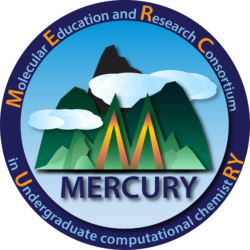
15TH ANNUAL MERCURY CONFERENCE ON UNDERGRADUATE COMPUTATIONAL CHEMISTRY
July 21-23, 2016
BUCKNELL UNIVERSITY
Lewisburg, PA
Mainstays of the conference included six speakers who present excellent talks that provide background and specific findings in their respective fields, plus an undergraduate poster session and evening social networking events. This conference is an excellent forum for undergraduates to present their work and to learn from experts in the field, allowing them to put their own research into perspective. It is equally valuable as a networking event for faculty working with undergraduates. Undergraduates from all types of institutions were invited to come present their work. Students who have graduated from college and have not begun their graduate work are also invited to present. Graduate students and postdoctoral associates may attend and will have the opportunity to learn how professors work effectively with undergraduate research students.
Speakers
This year’s speakers were:
Chris Cramer
University of Minnesota
Title: Spiral Feedback for Catalyst Design: Experiment and Theory
Jeff Evanseck
Duquesne University
Title: Biomolecular Dynamics, Function, Visualization, and the Energy Landscape
Kate Holloway
Merck Research Laboratories
Title: Arresting AIDS and Curing Hepatitis C: A Career in Computer-Aided Drug Design (CADD)
Richard Pastor
National Institutes of Health (NIH)
Title: How do Antimicrobial Peptides Disrupt Membranes?
Steven Wheeler
Texas A&M University
Title: Unconstrained by Reality: Adventures in Computational Physical Organic Chemistry
Chris Wilmer
University of Pittsburgh
Title: Discovering Materials to Stop Climate Change using Molecular Simulations
NSF and Research Corporation sponsored Workshop
On Thursday, July 21, from 1:30 – 5:00 pm, just before the conference officially starts, there was a mini-workshop on visualizing quantum dynamics. The workshop was led by Prof. Joe Subotnik (University of Pennyslvania). In just a few hours, students learned how to look at wavepackets in real time using MATLAB and just 20 lines of code. This workshop should be very useful for anyone who has taken physical chemistry as an undergraduate but always wondered how to extract simple intuition about quantum chemistry and not get lost in the mathematics. Computers to the rescue! The workshop was free and lunch was provided as well.


